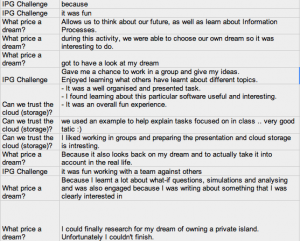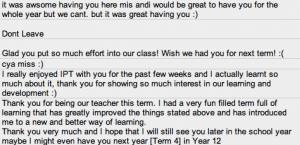Term 2 2012 was spent as a relief teacher, teaching Computing Studies to mostly boys in years 7, 8, 9, 11 and 12. When I started that journey, I had a dream of Students as Teachers, a post I ended with:
Students will learn. This time, I’ll let them teach…each other…and quite possibly, me.With changing perspectives, (my) teaching is evolving and I find that exciting. For the record, I’m also a little scared it’ll fail, i.e. that I can’t facilitate my students to teach. I’ll try anyway.
I have blogged a fair bit about this 9-week journey and how I was such a GBL n00b, took risks with teaching and learning, “flirted” with Inquiry-based Learning via Clouds and Dreams, and generally just explore different teaching approaches (or styles).
I was always mindful about covering the required content BUT I knew I wanted MY students to get more out of their time with me. I wanted them to learn so much more than the bullet points on a syllabus document. The thing is, they do anyway, from most teachers, if not all. It’s just that we’re often not explicit about it nor give students time to reflect on their learning as well encourage questions and conversations (see related post, Not Much).
While I played with different teaching approaches, there were common themes: self-directed, specific and regular one-on-one feedback (face-to-face, written, online via Edmodo), do what you ask the students to do, and a driving mantra of “get to know the kids”.
But with my year 11s, I did one thing differently – and that’s to regularly give them time to reflect, in writing or online, on their learning: what they learned, mastered and struggled with. I think that this has helped them learn to learn. Here’s a snapshot of some responses to my end-of-term survey:
This was a class who initially answered the question “what have you learned?” with “Nothing” to “not much”. Now, I got: “we used an example to help explain tasks focused on in class .. very good tactic” and “Allows us to think about our future, as well as learn about Information Processes.”
Of the activities mentioned, you can read about “Can we trust the cloud?” and “What price a dream?“. The IPG challenge veered away from Inquiry-based learning as a competition designed to cover the rest of the syllabus content really quickly. Each group was assigned an Information Process to research on. Every lesson, the topics were swapped and each group then had to find mistakes, add more information and report plagiarism (it’s amazing how quickly they realised how easy it is to spot!). At the end, each topic was presented to the class. The prize was a free lunch from me – which turned out to be a class party where they all willingly chipped in ….it coincided with the end of term and my time with them.
It is interesting that there is a good spread of what activity each student liked the most. Some obviously preferred to work in groups. A few enjoyed competition. Many liked the personal and individual work. Regardless, the ability to articulate thoughts about their learning had improved for most students. And, none of these activities go towards their marks/grades.
I found that moving because that was a realisation of my dream; they were learning and teaching each other…me, too. As if that was not enough, read through some of the general comments.
And that’s how students made me cry! *at home*
I used to be embarrassed to say as a teacher, “I’m not passionate about teaching but I am passionate about learning”. Not anymore. I was designing learning experiences – very rarely did I “teach” the class collectively. Edna Sackson articulates this so well in this post: From Teaching to Learning.
I am accountable to cover syllabus content and I can’t let that go. What I have let go of is “control” because I can’t control learning. In letting go, I have allowed myself to explore other ways for the content to be learned….and maybe I was just lucky but this year 11 class engaged with the content more than I thought they would, and certainly some more than others! and that’s okay.
In a nutshell, here are what worked and I’d do again:
- diversified approach
- I’m really loving inquiry-based learning
- give time to reflect on learning
- talk about it, promote it
- get to know the kids
- design activities to accelerate the process. with my year 11s, for example: About Me wiki, one-on-one time in class, prompt/honest feedback on work, Dream document. As one student said before saying goodbye: “you found something good in all of us” – and why not? This is what makes people tick.



Wow Malyn, This is inspiring! I love the fact that you took the time to reflect and report on your experiences. I am inspired to read more about Edna Sackson. I love the fact that you were designing learning experiences rather than teaching plans. The focus really was on what you wanted the students to learn. I also think its interesting to see what you can do when you plan and organise something different. I love it. Thanks for sharing.
Hi Fiona. Thanks for your kind words.
Please, please, please read more of Edna Sackson’s blog/s. I promise you won’t be disappointed.
I’m a fairly new teacher but I have definitely realised you can’t teach someone who doesn’t want to learn so the best I can do is create opportunities to learn….and hopefully, teachable moments.
I love that you have shared that moment of realising teaching is learning and learning is learning whatever role we are in…
I enjoyed reading the one thing done differently with your year 11s–regularly giving them time to reflect, in writing or online, on their learning: what they learned, mastered and struggled with.
This is exactly what I am trying to encourage my staff to do… I look forward to sharing my journey with you!